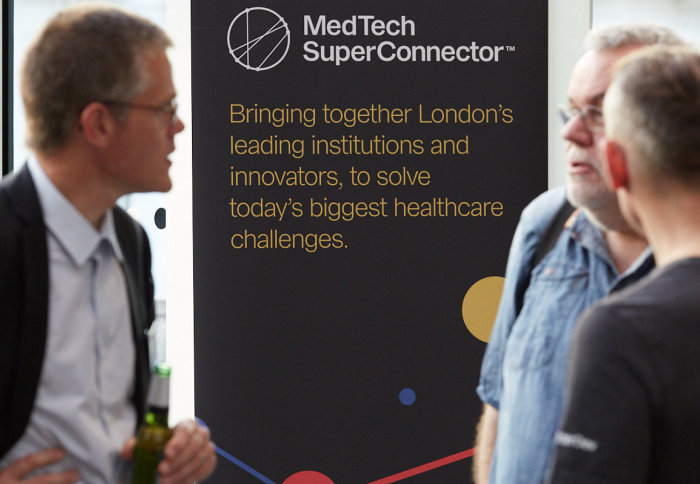Support for postdocs and postgrads to develop mental health tech ventures

Early-career researchers and postgraduates from all fields have until 20 January 2019 to apply to join a medical technology business accelerator.
The MedTech SuperConnector (MTSC) is inviting applicants with expertise in areas such as engineering, natural sciences, medicine, psychology, product design and business to join an initial hackathon, an intensive weekend of problem-solving where they will have the opportunity to team up to brainstorm and develop product ideas. The products could be diagnostic or therapeutic devices or digital tools, and could use technologies such as robotics, data analytics or AI.
I would encourage those who haven’t considered med tech or entrepreneurship to see where your ingenuity leads you Hiten Thakrar MTSC Programme Manager
Following the hackathon, selected teams will have the chance to join a six-month part-time programme that will offer entrepreneurship training, co-working space and financial support including a £1,000 per month individual stipend and up to £60,000 in equity-free business funding.
Hiten Thakrar, MTSC Programme Manager, said: “We’re looking for participants from a range of academic backgrounds, and I would encourage those who haven’t considered the med tech field, or entrepreneurship in general, to join the hackathon and see where your ingenuity leads you. The programme aims to help bright minds from the academic community to begin an entrepreneurial journey, taking your research out of the lab and using it to promote mental health and happiness.”
A mental health challenge
The upcoming cohort of MTSC is the first to be based around a specific challenge, addressing mental health, wellbeing and happiness at a time when the government is recognising mental health as a priority and devoting an increasing share of NHS spending to it.
The original cohort invited participants from Imperial and partner institutions, Queen Mary University of London, Bucks New University, The Francis Crick Institute, Royal College of Art, Royal College of Music, Institute of Cancer Research and Royal Veterinary College, to share their expertise and translate academic work into innovative products addressing all areas of health.
Success stories from the first cohort
A computer vision tool for monitoring musculoskeletal disorders
Letizia Gionfrida, a researcher in the Department of Bioengineering and participant in the programme’s first cohort, is developing a smartphone-controlled platform that monitors musculoskeletal disorders such as rheumatoid arthritis using computer vision and machine learning. The tool is intended to let users to monitor the conditions more easily and accurately, helping clinicians, patients and care providers to predict relapses and pharmaceutical companies and medical researchers to objectively evaluate the effectiveness of therapeutics. The technology is nearing realisation with pre-clinical trials ongoing with the NHS in London and Leeds.
Ms Gionfrida said: “Taking part in the programme pretty much changed everything. I was a research scientist. This was the first time I thought of myself as an entrepreneur.” She attributes this to her supportive PhD supervisors, and the support provided by MTSC. “The programme manager is honestly brilliant. He is always suggesting lecturers and funders to talk to. My mentor, Suruchi Kothari, is helping me access funding and strategic relationships, as she has been clinical director of successful med tech companies in the past. People from the MedTech SuperConnector genuinely care about the success of your venture; it feels like a family.”
Adaptive robotics to improve the experience of prosthetic limbs
Ugur Tanriverdi, another member of the programme’s first cohort and a PhD candidate in the Department of Bioengineering, is developing an adaptive robotics startup aimed at improving the experience of using prosthetic limbs.
A prosthetic limb is attached to a patient’s residual limb via a rigid socket that is custom-moulded to fit the patient’s body. The problem is that the human body change shapes throughout the day and the socket does not. This can lead to painful wounds and blisters, and may require the patient to spend time in a wheelchair while a new socket is made. Mr Tanriverdi is developing a first-of-its kind wearable robotic device that fits between the socket and limb. His product Roliner automatically adapts to the user’s body shape using AI and allows the user to instantly customise the fitting via a smartphone. Mr Tanriverdi is currently applying for a grant from the European Institute of Innovation & Technology to further develop the technology.
Mr Tanriverdi says that MTSC offers not only financial support and encouragement, but access to valuable networks. “It is not just a supportive, friendly environment, but also a very serious endeavour. It offers connections, people and invitations. There are networking and PR events you’re invited to and this is how the right people find out what you’re doing.”
Imperial’s entrepreneurial ecosystem
MTSC is part of Imperial’s expanding ecosystem of entrepreneurship support services that help staff and students turn research into benefits for society. Other initiatives include Techcelerate, aimed at postdocs, and for students and alumni the Venture Catalyst Challenge, which is also currently accepting applications for its next round.
Article text (excluding photos or graphics) © Imperial College London.
Photos and graphics subject to third party copyright used with permission or © Imperial College London.
Reporter
David Silverman
Communications Division